|
And the Winner Is? - Part 2
By Yevgenia Borisova
|
The Moscow Times has documented enough falsification in the March
26 presidential election to question the legitimacy of the vote.
Yevgenia Borisova reports from Dagestan, Saratov, Tatarstan, Ingushetia,
Bashkortostan and Moscow, and by telephone from Novosibirsk, Kursk,
Nizhny Novgorod, Kabardino-Balkariya and Mordovia. With additional
reporting by Gary Peach from Kaliningrad, Nonna Chernyakova from
Vladivostok and Mayerbeck Nunayev from Chechnya.
See No Evil?
Federal elections law gives Russian and foreign organizations broad
powers to observe all voting day activities, and observers are supposed
to prevent the most crude abuses.
But observers were not everywhere. Communist and Yabloko party
observers allege having seen, or heard of, massive fraud, to the tune of
millions of votes. Zyuganov has claimed to have had 7 million votes
stolen from him, quite a lot if Putin won by about 2 million - but the
evidence provided for such claims, while often troubling, is not
complete.
Meanwhile, it's hard to know how seriously to take foreign
observers. Consider the biggest, the Organization for Security and
Cooperation in Europe, which sent a team of about 400 people to observe
both the 1999 Duma elections and then again three months later the
presidential vote. As with other foreign observer groups, about a 10th
of the OSCE teams were "long-term" observers with strong knowledge of
Russia and Russian, who arrived months beforehand to take an in-depth
look at the situation, while the other 380 or so were flown in late in
the game to watch the voting day.
Edouard Brunner, head of the OSCE delegation, told The Moscow Times
a week before the Duma vote that he expected "international observers
will come up with a statement [after the Dec. 19 vote] that the
elections were conducted in a democratic way." They did indeed (with the
exception of the least well-known of the lot, the European Media
Institute, which characterized the Duma vote as "sad" and a step back
from democracy for Russia).
The short-term foreign observers usually include the top officials
like Brunner - and it is they who tend to set the tone of the crucial
morning-after news conferences and press releases.
Following the presidential elections, long-term OSCE observers
interviewed by The Moscow Times, on strict condition of anonymity,
expressed disgust for the cheery tone of the day-after OSCE commentary -
and dissatisfaction that the more thorough, official OSCE report on the
elections - which was published two months later and was harsher and
more informed - got no attention.
"They make the OSCE's press statement on the elections before the
long-term observers - and it's the long-term observers who really know
the story - have actually given their reports," said one long-term OSCE
observer. "They don't actually hear all the evidence before they write
it - and then what happens is, the longer report that the OSCE writes,
which is sometimes more critical, its overall tone is set by the press
statement.
"Because the press statement is the official stamp of approval.
That's what gets quoted in the newspapers ... That's what Putin's people
carry around with them in their hand. Nobody will read the detailed
report."
That detailed report, released May 19, is posted on the OSCE web
site. In it, the OSCE sticks to its initial finding that the elections
were democratic and a step forward for Russia. But the report also cites
anecdotal evidence from the long-term observers similar to stories heard
repeatedly by The Moscow Times - even as the report downplays the
significance of the abuses it chronicles and goes into little detail.
The OSCE report states, for example, that in fully half of all
polling stations visited by OSCE observers, "some of the cumbersome
procedural requirements for the vote count were circumvented in order to
expedite the process."
It also notes that the Communist Party observers in particular had
documented "episodic violations that, in and of themselves, would not
appear to be sufficient to alter the outcome," and then goes on to give
a jargon-softened list:
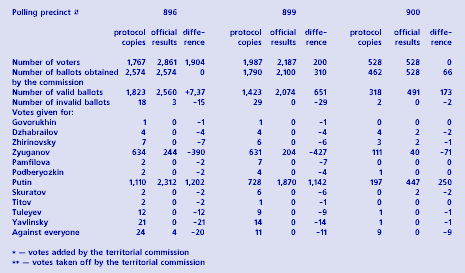
"For example, sporadic instances of family voting, inclusion of
deceased persons on voter lists, occasional denial of requests to
receive copies of protocols, various abuses of administrative resources,
improper influence of administrative authorities seen to be directing
the work of polling station commissions, expulsion of individual
observers from some sites, incidents of inequities regarding access to
the mass media, distribution of campaign material during the 'silent
period,' etc."
Caught Red-Handed in Dagestan 3: Even more discrepancies between
what was counted and reported locally in Makhachkala, and what was
officially recorded higher up by the territorial commissions.
Why Did They Do It?
"Other allegations were more serious and deserve the full weight of
investigation," the OSCE report continues. "They involved charges that
protocols were falsified, in some instances by reversing or increasing
the vote totals recorded for Putin over Zyuganov."
The report concludes that the OSCE observers "are not in a position
to judge the validity of the complaints raised by the Communist Party
and can draw no conclusions as to the proficiency and seriousness with
which they were reviewed by competent election commissions or the
courts."
Yet the OSCE did in effect reject the validity of those complaints
- when they endorsed the elections as free, fair and democratic. In
similar cases, such as the fraud-tainted April re-election of Peruvian
President Alberto Fujimori, Western observers complained until new
elections were held. The winner, again Fujimori, today enjoys more
legitimacy thanks to the exercise.
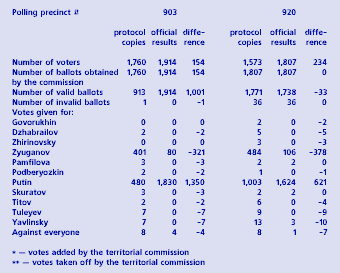
"Why did [Western observers] do it [endorse the Putin election as
legitimate]? In obvious support for what they call Russian reforms,"
said Boris Kagarlitsky, a sociologist and political analyst with the
Institute for Comparative Politics. "And of course in support for Putin
as a reformer. It is a credit of trust to Putin and an extension of the
support of the Chubais group," he added, referring to long-running
Western support for Anatoly Chubais, the architect of Russian
privatization programs.
"Many of these organizations, they have as it were a political
statement that they want to make before they go," said an OSCE long-term
observer unhappy with the organization's soothing official findings. "I
thought it was very, very ... totally cynical and unsatisfactory, and if
I had been writing the press statement I'd have given it a different
slant."
Caught Red-Handed in Dagestan 2: Even more discrepancies between
what was counted and reported locally in Makhachkala, and what was
officially recorded higher up by the territorial commissions.
Who Gave the Orders?
Not one person of those interviewed over the six months since the
election could offer compelling evidence that fraud was part of a
national conspiracy organized on direct orders from anyone in the
Kremlin.
But there is abundant evidence that in some of Russia's 89 regions,
orders to falsify the vote came down directly and formally from the
governors' offices - in a nation where governors from Kaliningrad to
Vladivostok all publicly embraced Putin's political vehicle Unity. And
there are reasons to believe that Kremlin officials might have made
clear, with not-always-subtle hints, that regional leaders were expected
to deliver the Putin vote by hook or by crook.
Consider just the example of the 1995 Duma elections, when
then-Prime Minister Viktor Chernomyrdin angrily and publicly berated
regional governors for not delivering the vote - and even threatened to
engineer the downfall of governors of regions where Our Home Is Russia
did worst.
That the Putin team saw the apparatus of government as subordinate
to their campaign needs is suggested by the composition of the team
itself. According to the OSCE's final report on the March 26 vote, Putin
campaign staff included, among many others, three deputy heads of the
Kremlin administration; top Interior Ministry officials including the
first deputy minister and deputy police chiefs across the nation; top
Railways Ministry officials representing all of the country's major
railroad routes; and top officials from the tax and agriculture
ministries.
"[OSCE observers] in different regions encountered incidents where
campaign materials for the acting president were found in offices of
territorial election commissions," the OSCE report says, referring to
the unit that oversees 20 to 30 polling stations. "Some territorial
commissions acknowledged that they were instructed by the administration
to pick up Putin campaign materials for distribution in their areas.
Corroborating reports were submitted from territorial commissions as far
distant from one another as [Vladivostok] and Kazan.
"In one instance, the chairwoman of a territorial commission
acknowledged that one day earlier, she had received her first specific
order regarding promoting the acting president's campaign. At that time
she had been instructed to pick up campaign literature promoting his
candidacy at the same time as she picked up the ballots for her
territory."
Elections officials were also apparently bullied into making up
results - whether by adding "dead souls" to their count (see sidebar,
page VII) or "correcting" official lower-level results to favor Putin.
Not only were governors apparently bullying the local elections
officials in their fiefdoms, they were leaning on everyone else as well
- from mayors to the heads of schools, factories and collective farms.
The day after the elections, this was suggested in Nizhny Novgorod,
when Governor Ivan Sklyarov - in an angry speech to a hall filled with
squirming officials from across the region that was partially televised
- shouted at heads of districts where Zyuganov did unusually well. "This
post-factum revealed that there were orders given prior to the elections
that they should be organized in a particular way," said Oleg
Kotelnikov, a top Communist Party member in Nizhny Novgorod, by
telephone.
Tales like this can be heard across the nation. Consider Tatarstan:
"[Tatarstan President] Mintimer Sharipovich [Shaimiyev] collected
us, the heads of local governments, and said approximately this: 'If
Primakov had put forward his candidacy, we would call on Tatarstan's
people to vote for him. But as he has declined to do so, today the
republic urges its citizens to vote for Putin," recounted Rashid
Khamadeyev, mayor of the town of Naberezhniye Chelny, located 190
kilometers east of Kazan.
In an interview in the local newspaper Vecherniye Chelny, Mayor
Khamadeyev recalled how Shaimiyev continued his address:
"Today I earnestly urge our leaders to create initiative groups
headed by heads [of enterprises], and to organize public receptions at
every enterprise to support Putin's candidacy.
"Of course if [a local leader] does not desire to do so, he may
refuse. But after the elections, I have a great desire to analyze the
quality of work of each [factory director or local leader]. We will take
the results of each polling station and see how many people came and how
they voted. And we will see how each local leader worked - in whose
favor? And is it worth it to keep him in his post?"
In neighboring Bashkortostan, local government officials in regions
where Putin did worst consistently resigned afterward.
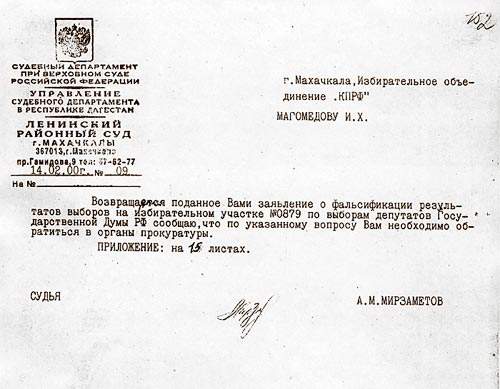
One such official, Ravil Khudaiberdin, who headed the local
government of the Uchaly district - 220 kilometers east of Ufa -
explained his resignation in wonderfully twisted logic in the newspaper
Nash Vybor. In Khudaiberdin's patch of Bashkortostan, Putin won 40.65
percent of the vote and Zyuganov 48.73.
"It's no secret that a major propaganda campaign was part of the
run-up to the elections. A personality was defined who could lead our
country by the way of democratization of our society - V.V. Putin. Our
local government, like others, was explaining who all must vote for, but
our appeals were not heard.
"This means that I and my team were not supported by the residents
of the city and district. Such a result in the elections is a vote of no
confidence in my administration, and that is why I decided to resign."
Magomedov appealed to the court and the prosecutor, but they
ignored his complaint.
How Bullying Works
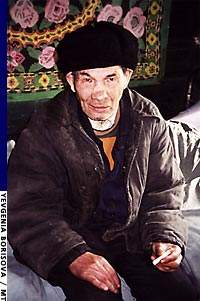
"I wanted to vote for Zhirinovsky," recounted pensioner Pyotr
Filippov, 71. "Zhirinovsky is a good lad, he promised us cheap bread.
But [Valentin] Markov, the head of our village, took away my ballot and
signed it for Putin."
Filippov is an ethnic Chuvash who lives in the Tatarstan village of
Tatarsky Saplyk, about 240 kilometers southeast of Kazan. As he spoke,
sitting on a shabby bed that doubles as a couch, his unemployed son
nodded in agreement. The son, too, had accompanied his father to the
precinct that day and also had wanted to vote for Zhirinovsky - but like
his father he had his ballot taken away and cast for Putin.
Other Tatarsky Saplyk residents recounted similar tales.
"The head of our collective farm told me, 'Sign for Putin,' and
grabbed my pen from me," said Nikolai, a 40-year-old farmer who did not
want his last name published. "But I told him that I wanted to sign for
Zyuganov and grabbed back the pen, quickly marked [the box for] Zyuganov
and put it in the ballot box. He said to me, 'Look, I will get back at
you.'"
But Nikolai said he was not afraid because he has his own business.
"What can he do to me?" he asked rhetorically. "Last year, they
paid me just 300 rubles for the entire year. But now I've found a
private job - I do window frames - and I don't care what he says."
Tatarsky Saplyk is located in the rural Drazhzhanovsky district - a
traditionally Communist patch of Tatarstan not supervised by any
elections observers. Putin won this collective farming region with a
staggering 86.2 percent, while Zyuganov earned just 8.05 percent.
The Communists are not alone in attributing this landslide for
Putin to the persuasive power of "administrative resources" - that
vertical chain of bullying governors set in action when they order their
underlings to bring in the Putin vote or be sacked.
"I think that this [bullying] has affected the final results of the
presidential elections more than even direct falsification of votes,"
said Viktor Sheinis, a professor at the Institute of the World Economy
and International Relations, a branch of the Russian Academy of
Sciences.
Sheinis said regional chieftains easily manipulate the average
rural Russians.
"They look at the peasants like a boa constrictor does at a rabbit.
The level of political culture in our villages is not high, it is not
Moscow - if something happens here, no one will pay attention," he said.
"And if some babushka comes to vote, and she is completely dependent on
the administration chief for getting wood and fodder for her animals -
she will of course vote the way he tells her to."
For years now, collective farms in Tatarstan, Bashkortostan, Kursk,
Mordovia and Dagestan - to name five regions where "administrative
resource" bullying was rampant - have been failing to pay wages on time,
and instead have paid in goods produced at the farms such as wheat,
sugar and hay. These goods are a survival kit for villagers that
supplements what they raise in their own gardens and from their own
domestic animals - and a weapon at times of elections.
"In the village of Permiyevo, where I am from, the head of the
collective farm told villagers that if they vote for Zyuganov, he would
find out - and they would not get tractors for sowing, or wood, or
food," said Valentina Lyukzayeva, a secretary of the Communist Party in
Mordovia, in a telephone interview. "The villagers, most of whom are old
women, of course got frightened and voted for Putin."
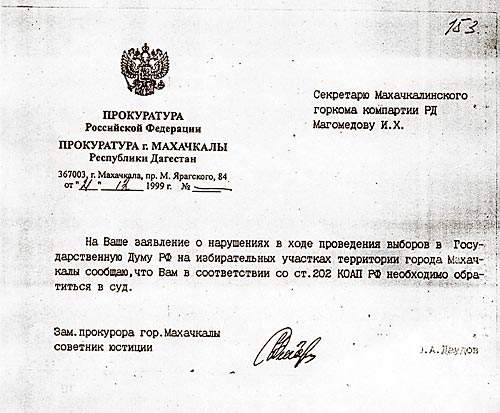
In some cases, not just voters but even official observers were
told to choose between obedience and hunger.
"In many polling stations our observers were threatened that they
would not receive food and fodder packages," said Rinat Gabidullin, a
secretary of Bashkortostan's Communist Party.
Gabidullin argues that villagers as a class across the nation were
simply excluded from the democratic process. But it's not just villagers
who are so weak: All state employees, from education workers to police
officers to city hall secretaries, have proven in interviews to have
been vulnerable to such pressure. A feature common to some of the
worst-run elections commissions, notably in Dagestan and
Kabardino-Balkariya, was that they would be made up almost entirely from
the staff of a particular school or institute of higher learning - and
chaired by the head of the institute.
Magomedov appealed to the court and the prosecutor, but they
ignored his complaint.
The Caterpillar
This report has so far been a discussion of fraud introduced within
the state apparatus - either by abusing state power to bully voters, or
by pressuring elections officials to one way or another misreport or
skew results.
But fraud was also introduced from outside the system - most
spectacularly in Tatarstan - by a crawling system of ballot-box stuffing
that came to be referred to as "the caterpillar." This practice was so
widespread that Vladimir Shevchuk, head of the Tatarstan Elections-2000
Press Center, not only admitted it had existed, he even explained how it
works.
"There are people standing near the elections precincts and when
they see a voter coming up, they offer him or her 50 rubles or a 100
rubles so that he or she takes a pre-filled-in ballot to drop in the
box, and then returns with a blank ballot," Shevchuk said. "Then [the
fraudsters] fill in the new clean ballot and offer it to the next
voter."
Shevchuk added that in December, during the State Duma elections,
even President Shaimiyev's spokesman Irek Murtazin was asked to play the
caterpillar game. And in a telephone interview, Murtazin confirmed that
he had been given 50 rubles for stuffing a ballot - although he added
that he had cheated the cheaters, and that the ballot in question had
not been for the Duma elections but for parallel elections to the
Tatarstan legislative assembly.
"I took their ballot and put an additional mark on it - thus
spoiling it - and took them out a clean ballot. I wanted to vote against
everyone anyway," Murtazin said, laughing.
The caterpillar might have been nearly foolproof. But not everyone
was content to earn just 50 rubles. Three people were arrested at
separate Tatarstan polling stations for trying to stuff large packets of
ballots into the ballot box - always in favor of Putin, but sometimes
also in favor of a candidate in local legislative elections, said Alexei
Afanasiev, a legal adviser to the Communist Party in Tatarstan.
Afanasiev said nothing seems to have come of the investigations
into those arrests, though all three still await trial.
One of those ballot-box stuffers was caught by Felix Rashidov, a
member of the elections commission at Kazan's 263rd voting precinct.
"Suddenly one voter approached us and told us to come quickly to
the ballot box," Rashidov recounted in an interview. "We saw a
Caucasian-looking man put a large pack of ballots into the box!
"We immediately grabbed him and called the police," Rashidov said.
"An official report was made, the ballot box was opened and the ballots
were taken out. There were two lots [bundled together] - 12 ballots were
filled in for Putin and 12 for a local candidate to Tatarstan's
legislative assembly."
Who paid for the ballots to be stuffed? It's hard to say. But even
here, there are signs that ballot-box stuffing can be traced back to
"administrative resources" abuses. In Dagestan, for example, an
elections commission member for Makhachkala's 931st voting precinct said
she learned a local school had been pressuring parents of students to
sneak in ballots for Putin and stuff them into the box.
"After election day, two pairs of parents brought me two small
packets of ballots - three ballots in each packet - that they said they
had been given by teachers of their children, to stuff into the ballot
box along with their own [votes]."




